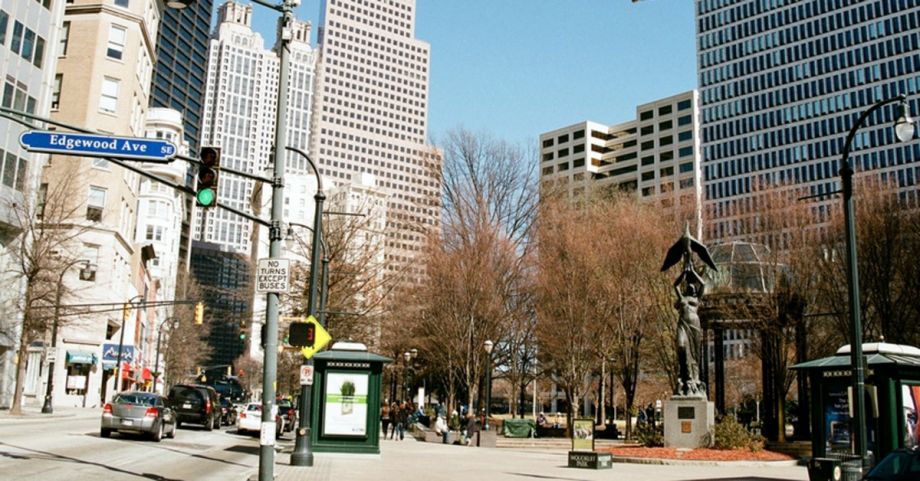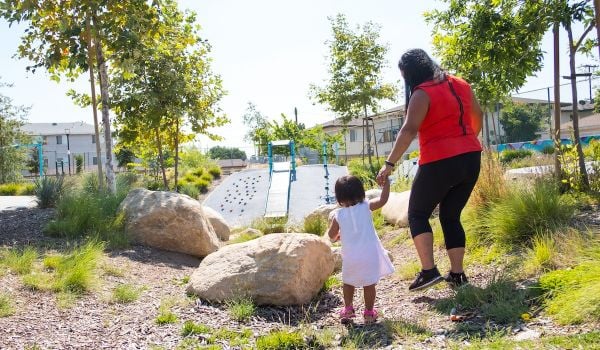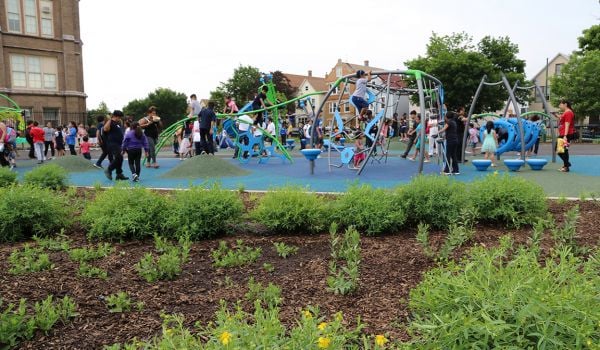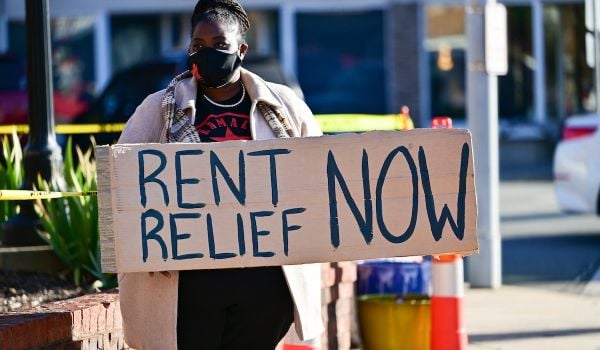At least three days a week, Janika Robinson takes a walk around Woodruff Park in downtown Atlanta and greets parkgoers.
For people she doesn’t know, Robinson introduces herself and lets them know why she’s here: to guide them to any resources they need.
Robinson is a case manager dedicated full-time to Woodruff Park, where she talks with the many people there who experience homelessness. She provides housing and social assistance and service referrals for anyone who approaches her.
“Your main objective is to build that relationship and to let them kind of come to you,” Robinson says. “When they come to you, that means they’re ready.”
Woodruff Park is one of the few parks nationwide that has its own case manager or social worker. Robinson became Woodruff’s first case manager in September 2018. Since then, she’s helped place 135 people in permanent housing and connected more than 1,000 others to social services.
After dipping for a few years, the number of people experiencing homelessness in Atlanta increased in 2019. Nationally, the rate of homelessness went up in 2019 for the third year in a row, according to the National Alliance to End Homelessness. There have been concerns that evictions brought on by the tolls of COVID-19 could lead to an increase.
A park is a strategic spot to meet people who need assistance, Robinson says.
“Parks are public spaces that most people utilize for various reasons, but a big reason that they come is to think,” she says. “I meet a lot of people that say, ‘Well, this just happened to me and I just came here because I need to clear my mind.’ And it’s very common that you find a person right after any type of crisis or any type of anything, they wander into the park because it’s a place where they can sit down. They won’t be questioned… So in the park, you will find a lot of social issues, whether you’re looking for them or not. There are a lot of social issues around every park. You just have to have someone dedicated to looking into them.”
Other public places have social workers in place. Libraries in New Jersey, Colorado, Washington, D.C., and a host of other places hire trained professionals.
Robinson works for HOPE Atlanta, a nonprofit addressing homelessness. The Woodruff Park program is a partnership between the organization and the Atlanta Downtown Improvement District, a public-private partnership funded by a community improvement district. ADID, which manages upkeep of Woodruff Park, approached HOPE Atlanta about ways to work with people who are unsheltered.
At Woodruff Park, Robinson has about 150 people on her caseload at any given time. Out of that, she is actively case managing 50 clients, working on housing plans and gathering necessary documents. She helps connect people with what they need at the moment: shelter beds, short-term lodging, rehabilitation programs, long-term housing.
It can take up to two weeks to get a client into a shelter once they request it, with single men taking less time because Atlanta has fewer women’s shelters, Robinson says. Placing someone in permanent supportive housing takes eight months to a year.
COVID-19 has factored into Robinson’s work. She used to walk around Woodruff Park every workday, but she now works remotely two days a week. She has a COVID-19 symptom screening tool and reminds people in the park to allow six feet between each other.
Robinson says it’s convenient being dedicated to Woodruff Park because it’s in a central location. She can easily point to places that people need to go to, such as nearby Grady Memorial Hospital. And compared to covering large geographical areas, working in a compact place such as the six-acre Woodruff Park allows Robinson to concentrate her efforts.
That’s much of the reason behind the program.
Many outreach initiatives cover a wide geography, but place-based outreach at parks and other public spots allows for more focus, says Jeff Smythe, executive director of HOPE Atlanta.
“Atlanta Downtown [Improvement District] has chosen to say we’re not going to kind of police our way out of this,” he says. “Often a response is to kind of come down on folks who are panhandling or who are just obviously unsheltered in a park.”
HOPE Atlanta also has case managers dedicated to Hartsfield-Jackson Atlanta International Airport, which has seen more than 250 people coming for shelter on some nights in recent months. Smythe would also like to see case managers on MARTA, metro Atlanta’s transit system.
Robinson says one of the challenges of being dedicated to a park is not having anywhere to set up an office. She has an iPad to do enrollment in the park, but when she often needs to print out paperwork, she must go to her office across the street. Clients also require privacy for conversations, something unavailable in a public space.
“Talking about it in the open, sometimes we’ll never get to the problem because they won’t discuss it,” Robinson says.
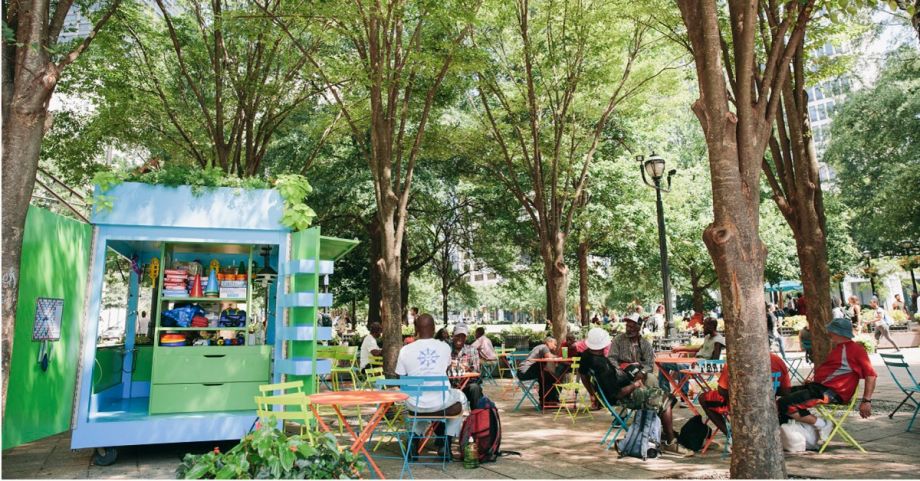
People play games from a cart at Woodruff Park. The cart is slated to reopen by September, depending on the state of COVID-19. (Photo courtesy Atlanta Downtown)
It’s necessary to have case managers and social workers at specific places such as Woodruff Park in order to help connect people with resources, says Alison Johnson, executive director of community-led organization Housing Justice League. But she cautions that this sort of support isn’t a substitute for systemic change that would lead to less people experiencing homelessness in the first place, adding that everyone should think of housing as a human right.
“We can really think more strategically about housing and not just seeing housing as brick and mortar,” Johnson says. “People must be connected inextricably to opportunities of job, wellness, health care. So I think we could be doing a lot more than just having a social worker in the park.”
As COVID-19 cases continue to rise in metro Atlanta and put people out of work, especially among Black communities, evictions are a worry. Housing Justice League is working to organize apartment complexes in order to negotiate rent with landlords. Atlanta extended a moratorium through Aug. 31 on evictions, applicable only to tenants who rent from a designated quasi-governmental entity that provides housing .
The program at Woodruff Park runs through the end of the year, but there are talks about extending it into 2021. There’s more work for a dedicated case manager to do.
It’s a model that other parks across the country could use, Robinson says.
“This should definitely be done in a lot of parks,” she says. “A lot of parks see these same social, economic issues and they ignore them or they just push the people out of the park or close the park down.”
This story is part of The Power of Parks, a series exploring how parks and recreation facilities and services can help cities achieve their goals in wellness, conservation and social equity. The Power of Parks is supported by a grant from the National Recreation and Park Association.

Adina Solomon is a freelance journalist based in Atlanta. She writes on a range of topics with specialties in city design, business and death. Her work has appeared in The Washington Post, CityLab, U.S. News & World Report, and other national and local outlets.

